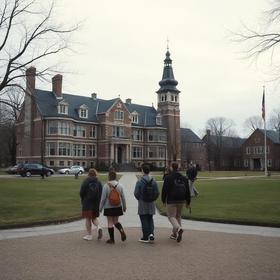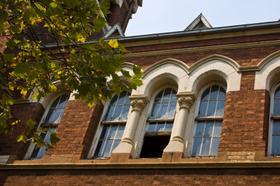The COVID-19 pandemic has turned all of our lives upside down. This is especially true when it comes to international students planning to attend private school in the United States for academic year 2020-2021 and 2021-2022.
What is different about obtaining student visas in 2020?
In normal times, the admissions process for international students contained many steps and was complicated by the additional requirement of obtaining a student visa. Here is what the Department of State has to say about student visas:
Student Acceptance at a SEVP Approved School
The first step is to apply to a SEVP-approved school in the United States. After the SEVP-approved school accepts your enrollment, you will be registered for the Student and Exchange Visitor Information System (SEVIS) and must pay the SEVIS I-901 fee. The SEVP-approved school will issue you a Form I-20. After you receive the Form I-20 and register in SEVIS, you may apply at a U.S. Embassy or Consulate for a student (F or M) visa. You must present the Form I-20 to the consular officer when you attend your visa interview.
What about traveling to the United States?
What's causing problems for families planning for academic year 2020-2021 is travel. Depending on the country your child is coming from, he can expect to be quarantined, and possibly even denied admission. If I were a foreign national sending my child to the United States, I would not send him alone. I would travel with him. I would have my Plan B ready to execute. Plan B? My Plan B would include a place to shelter close to the school, as well as open tickets to return to my home if necessary. Travel can be problematic during the pandemic. Be aware of that and plan accordingly.
Are there countries from which travel restrictions are in place?
From the Centers for Disease Control:
With specific exceptions, foreign nationals who have been in any of the following countries during the past 14 days may not enter the United States. For a full list of exceptions, please refer to the relevant proclamations in the links below.
- China
- Iran
- European Schengen area (Austria, Belgium, Czech Republic, Denmark, Estonia, Finland, France, Germany, Greece, Hungary, Iceland, Italy, Latvia, Liechtenstein, Lithuania, Luxembourg, Malta, Netherlands, Norway, Poland, Portugal, Slovakia, Slovenia, Spain, Sweden, Switzerland, Monaco, San Marino, Vatican City)
- United Kingdom (England, Scotland, Wales, Northern Ireland)
- Republic of Ireland
- Brazil
Will international students still be allowed to enroll in American private K-12 schools?
The situation is very fluid and uncertain.
Catherine Rampell in The Washington-Post reports:
"Two major U.S. policy decisions are expected to hold back enrollment."
"First, U.S. embassies and consulates around the world suspended routine services amid pandemic closures; that includes processing of student visas. The State Department says visa services are being phased back in, but it hasn’t given dates for when it will reopen which consulates. And even if consulates in countries that send the largest numbers of students, such as India, reopen soon, there’s likely to be a big backlog of applications to be processed."
"Already, there may not be sufficient time to process and approve visas for the fall semester — which at many institutions begins in weeks."
"Additionally, many countries are still subject to U.S. travel bans related to the pandemic. Even if consulates reopen, it’s unclear whether students from these places can get U.S. visas. At least one consulate, in Vienna, has said students may qualify for “national interest exceptions” to the travel ban; but State Department higher-ups have not issued policy.
Countries subject to covid-19-related travel bans — including China, Europe’s Schengen zone and Britain — accounted for about 40 percent of international students in the United States in 2018-2019, according to the Institute of International Education."
Does my child have to be tested and/or quarantined before he arrives at school?
Each school seems to have set out testing and quarantine requirements for all students, not just international students. A typical requirement is a 14 day quarantine immediately prior to arriving at school. As well, your child will be required to have a PCR or polymerise chain reaction test a few days before he arrives at school. Tip: make sure the test-taking organization can provide test results within 24-48 hours. Your school will advise you of its specific requirements well in advance.
Kent School's COVID-19 Reopening Action Plan is an example of one top boarding school's reopening plan. It is reassuring to note that Kent School's plan was developed with the advice and guidance of health professionals and the state and regional health services. As always with a boarding school, the safety of all members of its community is paramount.
Will additional testing be required during the school year?
Yes. Charges for the common polymerise chain reaction (PCR) test will be billed to your account.
Do I need to supply my child with masks?
Yes. Since everybody will be required to wear a mask, supply your child with at least 12 washable, reusable 2-ply masks. The school will have additional masks available. These will be billed to your account.
What happens when schools cease in-person instruction and flip to online instruction?
SEVP Stakeholders: Read about SEVP Adaptations in Response to COVID-19 details the steps schools and students have to take to remain in compliance with SEVP regulations. Monitor the situation closely as the United States Immigration Service can issue new regulations without any warning.
Will I be allowed to visit my child once school is in session?
Most schools are developing plans for parental visits. Stay tuned.
Will my child be safe at the school?
While no school can guarantee your child's safety, boarding schools go to extraordinary lengths to ensure the wellbeing and safety of every member of their communities. For a successful outcome, they expect your understanding of and compliance with all their health and safety instructions.
Wearing masks, social distancing, washing hands constantly, sanitizing commonly used surfaces, opening doors with your shoulders, and many other measure are the new normal in 2020. Expect it to remain so for several years.
Questions? Contact us on Facebook. @boardingschoolreview












